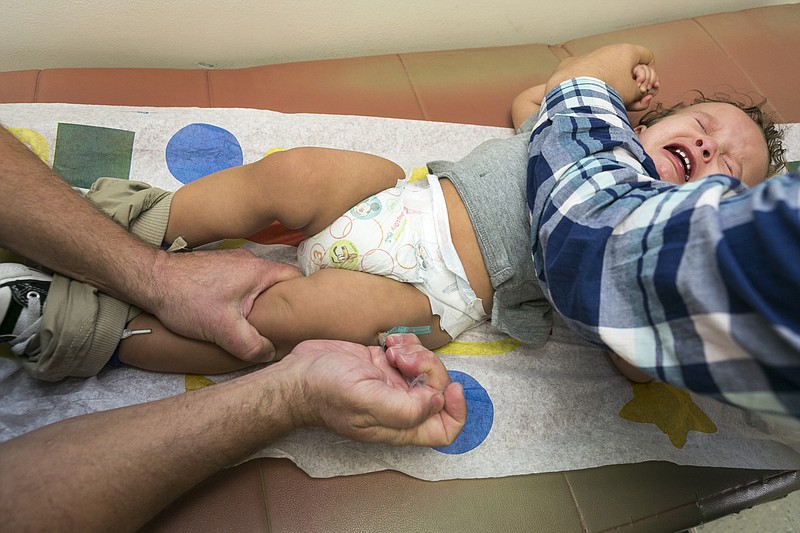Read more
Medical community seeks end of allowing parents to refuse vaccinations as measles threatens coming back, anti-vaccine movements grow
Most kindergartners in Southeast Tennessee schools last year got their required vaccinations by the time school was underway, Tennessee Department of Health data from the 2013-2014 school year shows.
But the data, which comes from both public and private schools, is more gray when it comes to students who are missing vaccine records. Out of 105 schools in Southeast Tennessee, 21 had more than 10 percent noncompliance in their kindergarten ranks.
At Orchard Knob Elementary, for example, 23 students -- close to 30 percent of kindergartners -- did not have the proper paperwork filed in the fall, when the state survey was collected. At Hillcrest Elementary School, about 28 percent were missing the paperwork, and at Falling Water Elementary, 26 percent did not meet requirements.
"A lot of those kids are actually vaccinated, they just don't have a good paper trail," said Sheryl Rogers, coordinator for health services at Hamilton County Schools.
That may be the case for a variety of reasons -- children may have changed doctors or moved, Rogers said. The numbers are collected at the beginning of the school year, and many students may not furnish records until weeks or months later.
A February USA Today analysis of school vaccination records found that at more than 2,200 public and private schools in 12 states, at least one-tenth of kindergarten students had either incomplete vaccination records or had fallen behind schedule in receiving their shots.
Shoana Anderson, who is the Nashville Department of Public Health's director of communicable disease and emergency preparedness, said that readily available, up-to-date information is critical in the rare event of an outbreak.
"If the paperwork is right there and not medically available, it can be very challenging," she said. "You're having to track down physicians and gather all these records and identify those who aren't immune. And with some of these diseases, you have a very short window before they spread."
Anderson knows that firsthand. In 2008, she was part of a team that tried to contain a measles outbreak at a Tucson, Ariz., hospital, during which some workers and students had to stay home for days because they could not provide proof of immunization.
In Hamilton County, schools must follow up with children's families on a case-by-case basis, explained Rogers. But if too much time goes by, students may be suspended until the forms are produced. How those cases are resolved, and how many obtain an exemption, is not clear from the state data.
It is also not clear how the rate of kids with religious or medical exemptions may shift or grow in later years as older, grade-school children transfer into the school.
Incoming transfers at higher grade levels means the number of vaccine exemptions tends to increase, Rogers said. While those kids must either be vaccinated or qualify for an exemption before they can enrolled, there is no way to track exempt students from school to school.
"I wish we had a tracking system where we could see, so we would be alerted to where the pockets are, where those kids are. We have a host of handicapped students and they have compromised immune systems. And we would have to quickly make adjustments in the case of an outbreak," said Rogers.
The state no longer has the seventh-grade audit it once used to see how rates compare as children age. The Tennessee Department of Health did not respond to requests for comment.
Connie Bueckner, communicable disease program manager for the Chattanooga-Hamilton County Health Department, said that checks are in place to make sure no one flies under the radar.
"What we compile here is looked at very thoroughly by the state, and when we're called on to perform audits at particular schools, we evaluate them," she said.
Contact staff writer Kate Belz at kbelz@times freepress.com or 423-757-6673.
